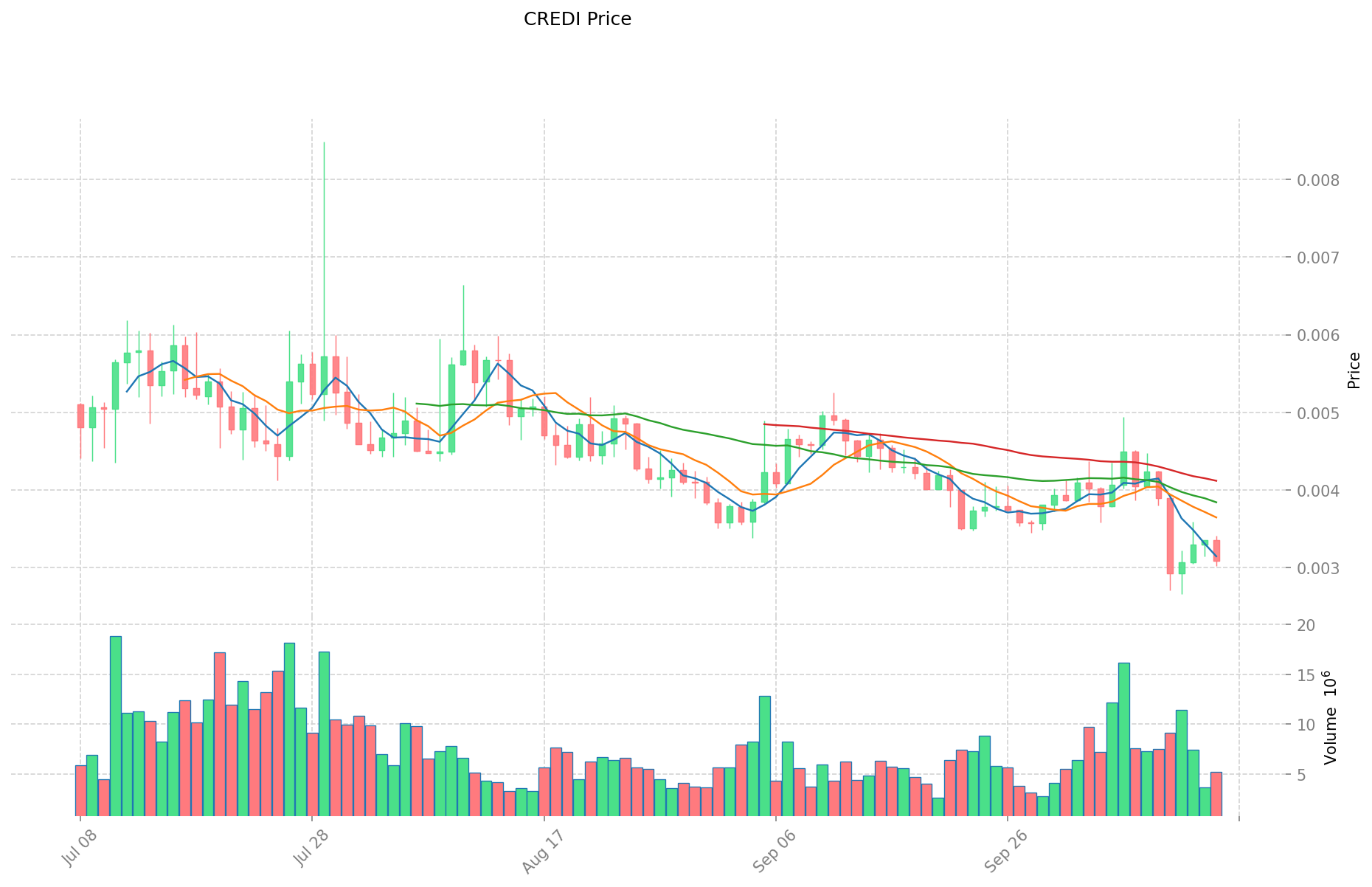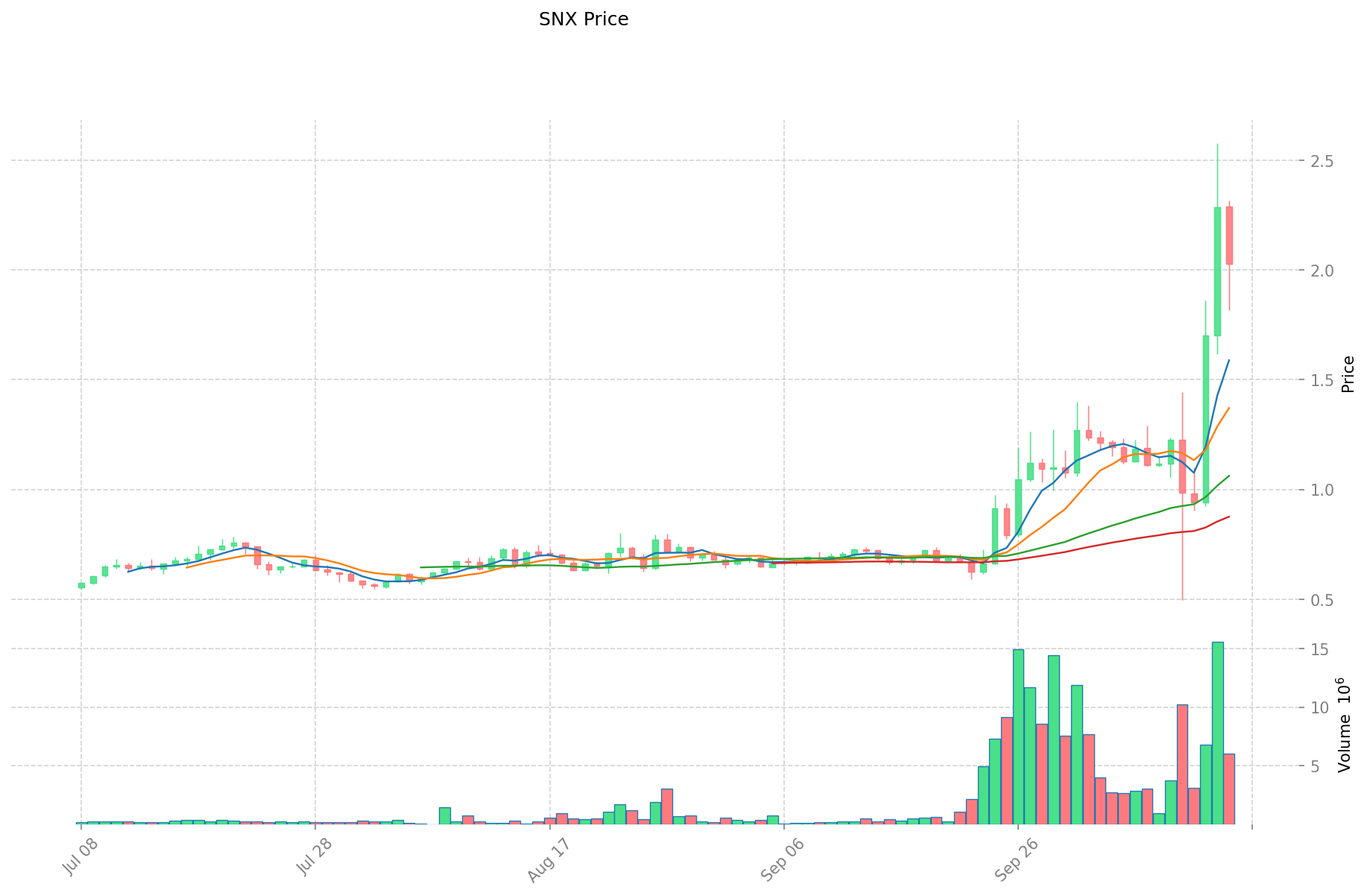CREDI vs SNX: Comparing Two DeFi Protocols for Yield Generation
Introduction: CREDI vs SNX Investment Comparison
In the cryptocurrency market, the comparison between CREDI vs SNX has always been a topic that investors cannot ignore. The two not only have significant differences in market cap ranking, application scenarios, and price performance, but also represent different cryptocurrency asset positioning.
Credefi (CREDI): Launched in 2021, it has gained market recognition for its alternative lending FinTech solution connecting crypto lenders and SME borrowers from the real economy.
Synthetix (SNX): Introduced in 2018, it has been hailed as a decentralized finance (DeFi) platform for creating synthetic assets, becoming one of the leading projects in the DeFi space.
This article will comprehensively analyze the investment value comparison between CREDI and SNX, focusing on historical price trends, supply mechanisms, institutional adoption, technical ecosystems, and future predictions, attempting to answer the question that concerns investors the most:
"Which is the better buy right now?"
I. Price History Comparison and Current Market Status
CREDI (Coin A) and SNX (Coin B) Historical Price Trends
- 2024: CREDI reached its all-time high of $0.03456 on April 3, 2024.
- 2025: SNX experienced significant volatility, with price fluctuations ranging from $0.0347864 to $28.53.
- Comparative analysis: In the recent market cycle, CREDI dropped from its high of $0.03456 to a low of $0.002652, while SNX showed greater resilience, maintaining a higher price range.
Current Market Situation (October 15, 2025)
- CREDI current price: $0.003079
- SNX current price: $2.0229
- 24-hour trading volume: CREDI $16,535.20 vs SNX $12,296,492.15
- Market Sentiment Index (Fear & Greed Index): 34 (Fear)
Click to view real-time prices:
- Check CREDI current price Market Price
- Check SNX current price Market Price


Investment Value Analysis: CREDI vs SNX in DeFi
I. Introduction to CREDI and SNX in the DeFi Landscape
II. Core Factors Affecting Investment Value of CREDI vs SNX
Supply Mechanism Comparison (Tokenomics)
- SNX: Used as collateral in large staking pools to mint synthetic derivatives; requires maintaining specific collateralization ratios to avoid liquidation
- CREDI: Value primarily tied to its role in decentralized insurance mechanisms within DeFi
- 📌 Historical pattern: Collateralization requirements drive price cycles, particularly during high market volatility periods
Institutional Adoption and Market Applications
- Institutional holdings: SNX has more established presence with recognizable financial reporting (8-K and 10-K forms mentioned)
- Enterprise adoption: SNX serves as foundation for synthetic assets creation in DeFi platforms, enabling exposure to various financial instruments
- Regulatory stance: Both operate in evolving regulatory environments for DeFi protocols
Technical Development and Ecosystem Building
- SNX technical development: Powers the Synthetix protocol allowing users to create synthetic derivatives while maintaining collateralization
- CREDI technical development: Focused on decentralized insurance infrastructure
- Ecosystem comparison: SNX has more established integration within broader DeFi ecosystem, particularly in synthetic assets markets and Uniswap liquidity pools
Macroeconomic Factors and Market Cycles
- Inflation environment performance: Both designed as part of DeFi infrastructure with different correlations to traditional market movements
- Macroeconomic monetary policy: Federal Reserve's liquidity environment impacts both tokens, with SNX showing sensitivity to broader market conditions
- Geopolitical factors: Cross-border transaction demands impact adoption of decentralized financial instruments
III. Risk Assessment and Future Outlook
III. 2025-2030 Price Prediction: CREDI vs SNX
Short-term Prediction (2025)
- CREDI: Conservative $0.00249156 - $0.003076 | Optimistic $0.003076 - $0.00319904
- SNX: Conservative $1.066716 - $2.0916 | Optimistic $2.0916 - $2.698164
Mid-term Prediction (2027)
- CREDI may enter a growth phase, with estimated prices ranging from $0.002708307264 to $0.004144036416
- SNX may enter a bullish market, with estimated prices ranging from $1.423757349 to $3.534845832
- Key drivers: Institutional capital inflow, ETF, ecosystem development
Long-term Prediction (2030)
- CREDI: Base scenario $0.00426868707358 - $0.005037050746825 | Optimistic scenario $0.005037050746825+
- SNX: Base scenario $3.992068321353 - $5.06992676811831 | Optimistic scenario $5.06992676811831+
Disclaimer: The above predictions are based on historical data and current market trends. Cryptocurrency markets are highly volatile and subject to rapid changes. These forecasts should not be considered as financial advice. Always conduct your own research before making any investment decisions.
CREDI:
| 年份 | 预测最高价 | 预测平均价格 | 预测最低价 | 涨跌幅 |
|---|---|---|---|---|
| 2025 | 0.00319904 | 0.003076 | 0.00249156 | 0 |
| 2026 | 0.0033885216 | 0.00313752 | 0.002980644 | 1 |
| 2027 | 0.004144036416 | 0.0032630208 | 0.002708307264 | 5 |
| 2028 | 0.00466644604608 | 0.003703528608 | 0.00311096403072 | 20 |
| 2029 | 0.004352386820121 | 0.00418498732704 | 0.003640938974524 | 35 |
| 2030 | 0.005037050746825 | 0.00426868707358 | 0.004055252719901 | 38 |
SNX:
| 年份 | 预测最高价 | 预测平均价格 | 预测最低价 | 涨跌幅 |
|---|---|---|---|---|
| 2025 | 2.698164 | 2.0916 | 1.066716 | 3 |
| 2026 | 2.5146261 | 2.394882 | 1.50877566 | 18 |
| 2027 | 3.534845832 | 2.45475405 | 1.423757349 | 21 |
| 2028 | 4.43230391268 | 2.994799941 | 2.6953199469 | 48 |
| 2029 | 4.270584715866 | 3.71355192684 | 3.4536032919612 | 83 |
| 2030 | 5.06992676811831 | 3.992068321353 | 3.87230627171241 | 97 |
IV. Investment Strategy Comparison: CREDI vs SNX
Long-term vs Short-term Investment Strategies
- CREDI: Suitable for investors focused on decentralized insurance and alternative lending in DeFi
- SNX: Suitable for investors interested in synthetic assets and broader DeFi ecosystem exposure
Risk Management and Asset Allocation
- Conservative investors: CREDI: 20% vs SNX: 80%
- Aggressive investors: CREDI: 40% vs SNX: 60%
- Hedging tools: Stablecoin allocation, options, cross-currency portfolios
V. Potential Risk Comparison
Market Risk
- CREDI: Higher volatility due to lower market cap and trading volume
- SNX: Exposure to broader DeFi market fluctuations and synthetic asset risks
Technical Risk
- CREDI: Scalability, network stability
- SNX: Collateralization ratio maintenance, smart contract vulnerabilities
Regulatory Risk
- Global regulatory policies may impact both tokens differently, with SNX potentially facing more scrutiny due to its synthetic asset creation function
VI. Conclusion: Which Is the Better Buy?
📌 Investment Value Summary:
- CREDI advantages: Potential growth in decentralized insurance sector, lower market cap with room for growth
- SNX advantages: Established presence in DeFi, broader ecosystem integration, higher liquidity
✅ Investment Advice:
- Novice investors: Consider a small allocation to SNX as part of a diversified crypto portfolio
- Experienced investors: Balanced approach with both CREDI and SNX, adjusting based on risk tolerance
- Institutional investors: Focus on SNX for its more established market presence and reporting standards
⚠️ Risk Warning: Cryptocurrency markets are highly volatile. This article does not constitute investment advice. None
FAQ
Q1: What are the main differences between CREDI and SNX? A: CREDI focuses on alternative lending and decentralized insurance in DeFi, while SNX powers the Synthetix protocol for creating synthetic assets. SNX has a larger market cap, higher trading volume, and more established presence in the DeFi ecosystem.
Q2: Which token has shown better price performance recently? A: SNX has shown greater price resilience compared to CREDI. While CREDI dropped from its all-time high of $0.03456 to $0.003079, SNX maintained a higher price range, currently trading at $2.0229.
Q3: How do the supply mechanisms of CREDI and SNX differ? A: SNX is used as collateral in large staking pools to mint synthetic derivatives and requires maintaining specific collateralization ratios. CREDI's value is primarily tied to its role in decentralized insurance mechanisms within DeFi.
Q4: What are the key factors affecting the investment value of these tokens? A: Key factors include supply mechanisms, institutional adoption, technical development, ecosystem integration, macroeconomic factors, and regulatory environments.
Q5: What are the predicted price ranges for CREDI and SNX in 2030? A: For CREDI, the base scenario predicts $0.00426868707358 - $0.005037050746825, with an optimistic scenario above $0.005037050746825. For SNX, the base scenario predicts $3.992068321353 - $5.06992676811831, with an optimistic scenario above $5.06992676811831.
Q6: How should investors allocate their portfolios between CREDI and SNX? A: Conservative investors might consider allocating 20% to CREDI and 80% to SNX, while aggressive investors might opt for 40% CREDI and 60% SNX. However, individual allocations should be based on personal risk tolerance and investment goals.
Q7: What are the main risks associated with investing in CREDI and SNX? A: Both tokens face market risks, technical risks, and regulatory risks. CREDI has higher volatility due to its lower market cap, while SNX is exposed to broader DeFi market fluctuations and synthetic asset risks. Both may be impacted by evolving global regulatory policies.
Share
Content